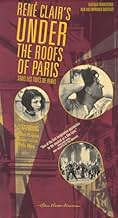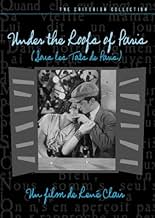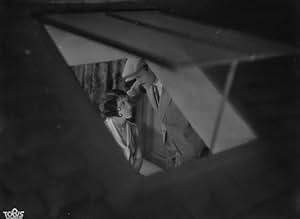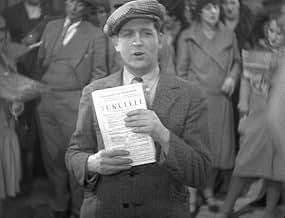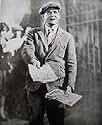IMDb RATING
7.0/10
2.6K
YOUR RATING
Albert is smitten for Pola but ends up wrongly committed in jail, in the meantime her affections are sought after by his friend, and on his release both love and friendship must be tested.Albert is smitten for Pola but ends up wrongly committed in jail, in the meantime her affections are sought after by his friend, and on his release both love and friendship must be tested.Albert is smitten for Pola but ends up wrongly committed in jail, in the meantime her affections are sought after by his friend, and on his release both love and friendship must be tested.
- Awards
- 1 win total
Edmond T. Gréville
- Louis
- (as Edmond Gréville)
Delphine Abdala
- La buraliste
- (uncredited)
Raymond Aimos
- Un gars du milieu
- (uncredited)
Raymond Blot
- Un membre de la bande à Fred
- (uncredited)
Thomy Bourdelle
- François
- (uncredited)
Léon Courtois
- L'inspecteur
- (uncredited)
Édouard Francomme
- Un membre de la bande à Fred
- (uncredited)
André Michaud
- Un agent
- (uncredited)
Jane Pierson
- La dame du premier
- (uncredited)
Louis Pré Fils
- Le locataire du troisième
- (uncredited)
Eugène Stuber
- Un membre de la bande à Fred
- (uncredited)
Louis Zellas
- Le consommateur jaloux
- (uncredited)
- Director
- Writer
- All cast & crew
- Production, box office & more at IMDbPro
7.02.6K
1
2
3
4
5
6
7
8
9
10
Featured reviews
Paris Nostalghia
The film marvellously shows the nostalgic dream of the old Paris and its common people. With melancholic irony, Clair tells a story of the milieu of backstreets and backyards, of street singers, pickpockets, fiddlers and strange townsmen. Here, his grasp into the present does not become realistic depictions of circumstances, but a poetic romance, for which reality is only one aspect of life.
In this regard, especially the sound has turned out quite well. And how hesitantly Clair used this new technical innovation! His generally critical attitude towards sound in films induced, that "Sous les toits" is mainly composed of silent parts (including many dialog scenes), which are highlighted with music or noises such as trains driving past. The song "Sous Les Toits De Paris" of Albert, the street singer, becomes to the red thread which links several scenes and bridges time distances. A fight taking place in the dark only informs the viewer through noises. For that, we witness a dispute, where the matter is uninteresting and predictable, without any sound - shot through a glass door. One can say sound is especially used for enrichment and left out when it would be needless. Thus, a film came into being that wonderfully combines sentiment, humor and intelligence with languishingly beautiful tunes.
In this regard, especially the sound has turned out quite well. And how hesitantly Clair used this new technical innovation! His generally critical attitude towards sound in films induced, that "Sous les toits" is mainly composed of silent parts (including many dialog scenes), which are highlighted with music or noises such as trains driving past. The song "Sous Les Toits De Paris" of Albert, the street singer, becomes to the red thread which links several scenes and bridges time distances. A fight taking place in the dark only informs the viewer through noises. For that, we witness a dispute, where the matter is uninteresting and predictable, without any sound - shot through a glass door. One can say sound is especially used for enrichment and left out when it would be needless. Thus, a film came into being that wonderfully combines sentiment, humor and intelligence with languishingly beautiful tunes.
A cinematic love letter to Paris
The great French film actor Jacques Tati made several films that tried to capture a Paris that disappeared even before World WarII. It was a world best seen through the gifted photography of Atget and Brassai. A world of intimacy, silent streets, virtually no traffic, limited means, but unlimited pleasures. A wonderful opening shot glides across rooftops to join a cluster of ordinary Parisians enjoying a singalong, an odd but compelling precursor of karaoke and rock concerts, but untarnished by special effects or hype. There is a sense that we are witnessing a street version of Lautrec's Moulin Rouge.
The cinematography is extraordinary. It can only be compared to Fritz Lang's "M", or the "Third Man". Very little actually happens and dialogue is used sporadically. Yet we find ourselves caring very much about the people about whom we know so little.
An unforgettable film.
The cinematography is extraordinary. It can only be compared to Fritz Lang's "M", or the "Third Man". Very little actually happens and dialogue is used sporadically. Yet we find ourselves caring very much about the people about whom we know so little.
An unforgettable film.
Parisian love letter
There were quite a few reasons for wanting to see 'Under the Roofs of Paris'. The premise sounded great. The title of the film is a charming and far from forgettable one. Not every early sound film is great or even good, with some silent film directors and actors not being able to transition from silent to sound. Have liked to loved other films of the very gifted Rene Clair, including other early sound films of his such as 'Le Million' (one of the best).
'Under the Roofs of Paris' isn't one of his best overall films. Also did prefer his other early sound films, namely 'Le Million' and 'Quartorze Juillet'. Also preferred 'A Nous La Liberte'. It is a very good film though and mostly accessible, even if the other three films had more story content and more rootable characters, have noticed that they have been the film's two main criticisms and can understand both. There is so much to recommend and all the good things of 'Under the Roofs of Paris' are brilliant.
Its weak link is the story, which is very slight and some of it is pretty uneventful.
Although the characters are very well played and quite interesting, they could have been developed more and will agree that they are not easy to get behind. Certainly didn't care for these characters as much as those in 'Le Million' and 'Quartorze Juillet'.
However, Clair's direction is absolutely immaculate and he depicts Paris in a way that is very nostalgic and full of atmosphere. It is very classy direction and is never static or dull, not all directors were comfortable with the silent film to sound transitioning but Clair was and it was like he was already a pro despite in reality being relatively new to it. The film is a clever mix of silent and sound, with no favouring of one over the other. The silent sections are handled with a lot of nuance and there is just as much energy as in the scenes with dialogue. The dialogue itself is not too talky and flows well, with a nice mix of amusing and touching in a sophisticated way.
Despite the story being very slight, there is charm and energy present too. The sound is cleverly used and doesn't come over as gratuitously random or gimmicky, no unrefined experimenting here. While there may not be standout performances as such, the actors play their characters with vigour and always in a natural way. The music is lovely to listen to, with a very infectious main song.
What stands out though in 'Under the Roofs of Paris' is the cinematography, which is pretty incredible. Not just very sophisticated, seamlessly fluid and really enhancing the handsomely and affectionately used locations, but also very creative in its technical skill (the case with all of Clair's early talkies).
In summary, not one of Clair's overall best or among his finest early works but as far as early talkies go 'Under the Roofs of Paris' fares better than most at this early stage of sound film development. 8/10
'Under the Roofs of Paris' isn't one of his best overall films. Also did prefer his other early sound films, namely 'Le Million' and 'Quartorze Juillet'. Also preferred 'A Nous La Liberte'. It is a very good film though and mostly accessible, even if the other three films had more story content and more rootable characters, have noticed that they have been the film's two main criticisms and can understand both. There is so much to recommend and all the good things of 'Under the Roofs of Paris' are brilliant.
Its weak link is the story, which is very slight and some of it is pretty uneventful.
Although the characters are very well played and quite interesting, they could have been developed more and will agree that they are not easy to get behind. Certainly didn't care for these characters as much as those in 'Le Million' and 'Quartorze Juillet'.
However, Clair's direction is absolutely immaculate and he depicts Paris in a way that is very nostalgic and full of atmosphere. It is very classy direction and is never static or dull, not all directors were comfortable with the silent film to sound transitioning but Clair was and it was like he was already a pro despite in reality being relatively new to it. The film is a clever mix of silent and sound, with no favouring of one over the other. The silent sections are handled with a lot of nuance and there is just as much energy as in the scenes with dialogue. The dialogue itself is not too talky and flows well, with a nice mix of amusing and touching in a sophisticated way.
Despite the story being very slight, there is charm and energy present too. The sound is cleverly used and doesn't come over as gratuitously random or gimmicky, no unrefined experimenting here. While there may not be standout performances as such, the actors play their characters with vigour and always in a natural way. The music is lovely to listen to, with a very infectious main song.
What stands out though in 'Under the Roofs of Paris' is the cinematography, which is pretty incredible. Not just very sophisticated, seamlessly fluid and really enhancing the handsomely and affectionately used locations, but also very creative in its technical skill (the case with all of Clair's early talkies).
In summary, not one of Clair's overall best or among his finest early works but as far as early talkies go 'Under the Roofs of Paris' fares better than most at this early stage of sound film development. 8/10
a beautiful musical masterpiece
Having been highly impressed by "Le Million", I decided to check out Rene Clair's other acclaimed musical comedy, "Under the Roofs of Paris". I can happily assure you that this film was even better than "Le Million" in almost every single way. It amps up the heart and humor, has a much stronger emotional impact, and, while "Le Million" felt like a purely plot driven film, "Under the Roofs of Paris" balances plot and character to near perfection.
This hilarious love story unfolds slowly and steadily, introducing the audience to different characters and places without rushing everything. We watch and learn before the plot strikes us like a lightning bolt of beauty. Rene Clair's camera beautifully glides through the streets of Paris, following characters and peaking in on their most fragile moments. This film is like the finest work of literature; it contains laughs and tears, moments of melancholy and hope. It is, simply, a masterpiece.
This hilarious love story unfolds slowly and steadily, introducing the audience to different characters and places without rushing everything. We watch and learn before the plot strikes us like a lightning bolt of beauty. Rene Clair's camera beautifully glides through the streets of Paris, following characters and peaking in on their most fragile moments. This film is like the finest work of literature; it contains laughs and tears, moments of melancholy and hope. It is, simply, a masterpiece.
this film shows a true relationship, no matter how messed up it can be.
--- this film changed my views on b&w, i first saw this when i was a wee lass of 13, awkward and shy, all i had to do with myself was watch late- night t.v. i cried so hard at the end of the film i thought for sure i'd wake my mum, thank god CBC showed it again not long after that, and like the big geek i was, and probably still am, i taped it, i liked the rawness of it, the sound wasn't very good, but it didn't matter, still doesn't, i would love to make a movie that has this same feeling the absolut "realness" i dislike the crud hollywood keeps churning out, but , the fact remains that i live in this time, and am almost forced to swallow the disgraceful porridge that is cinema. it's christmas day, i think i'll go slip on my "under the rooftops of paris" and dream of a time when film still had a heart!!
Did you know
- TriviaThe opening sequence and the street scenes were filmed in a studio.
- Quotes
Albert, a young street singer: [On seeing Pola bedding down on his bedroom floor] Okay, take the bed, I'll sleep on the floor.
- ConnectionsFeatured in Les dossiers de l'écran: Boulevard du crépuscule (1969)
- How long is Under the Roofs of Paris?Powered by Alexa
Details
- Runtime
- 1h 36m(96 min)
- Color
Contribute to this page
Suggest an edit or add missing content



